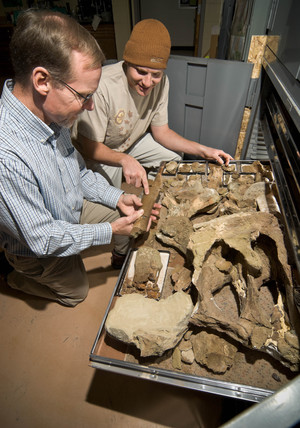CSC's online geoscience program continues to grow

CHADRON – Geoscience is more than studying rocks.
It’s actually a combination of sciences that study the earth, including geology, meteorology, hydrology and earth systems science, according to Chadron State College Physical and Life Sciences Professor Dr. Mike Leite.
Leite, who has taught geoscience at CSC since 1996, also said the earth is much more than a rock – it’s dynamic and a systematic approach drives it.
So, it makes sense Leite and other faculty in Chadron State’s Physical and Life Sciences department take a dynamic approach to offering an undergraduate geoscience degree – it’s available online. And, according to Leite, Chadron State’s online geoscience degree is the only college to offer a bachelor’s degree.
“It takes a lot of work but we wanted to broaden our base, so we went online,” Leite said. “A lot of people said we couldn’t do it online because so many things are field based, active, hands-on and face-to-face. So, it’s hard to imagine online. But we had science classes online that were successful and chemistry and physics employ virtual labs that work. So, we thought it could be done.”
Leite is proud of the program’s growth. In just three years since it began, the online geoscience program will have its first student graduate in the spring of 2017. And, of the 20 total geoscience students this semester, 14 are online. Prior to this year, Leite said there had never been more than five students who were online.
“From my experience, the online students are doing well and just as well as those in face-to-face classes,” Leite said.
The idea for an online geoscience degree came to Leite when he attended a conference several years ago. At the time, Mississippi State presented about its online master’s degree in geology and Leite thought a similar program would be successful at CSC.
“The online geoscience program has revolutionized my teaching methods,” he said. “Students are responsible for content and preparation for classroom. I explain and help work problems and I give the online students the same opportunities. A professor isn’t the source of knowledge anymore, but a collaborator. It’s my job to help students collect reliable information, apply it, integrate it and make it work together. It’s a challenge and you can’t give all students the same experience, but we give them collaborative experiences.”
One of those collaborative experiences covered half of the United States. Recently, an online student in Southern California performed field observations and collected rocks before mailing them to other students in the same class in Chadron. The students at CSC did the lab work to complete the project.
The online program, which Leite helped to develop, is rigorous. Online geoscience students can graduate in four years if they average more than 14 credit hours in the fall and spring semesters. The summers are equally as important with three years of field camp.
Field camp is the only face-to-face component of the online program, but it’s also among the most popular sections, Leite said. Students travel and live together for two weeks in the summer during an intensive course that in past years has taken them to various geological sites in Nebraska, Wyoming, Utah and Idaho. Students are introduced to field skills and how to use tools and measure angles, among other techniques.
“It takes a while to become comfortable with field skills and so field camp is complete immersion to the students,” Leite said. “It’s a one room schoolhouse and their skills are continually refined.”
Leite also said field camp is beneficial because it allows his students to see him as their peer.
“Everyone gets to know each other really fast. You live with your professor for two weeks and you start to see him as a colleague and not so much as a professor and I prefer that,” Leite said. “I enjoy field camp because I’m learning, too. Sometimes I don’t know all the answers to the questions, so we’re figuring it out together. The interactions are all so positive and I think I gain credibility and they see me as human.”
Category: Campus News, CSC Online, Physical and Life Sciences
